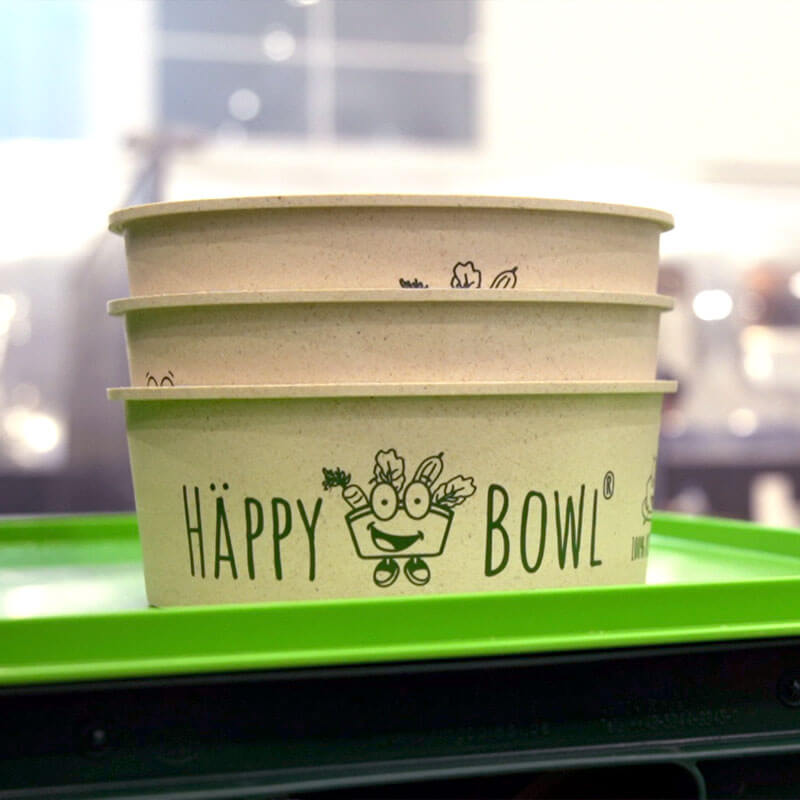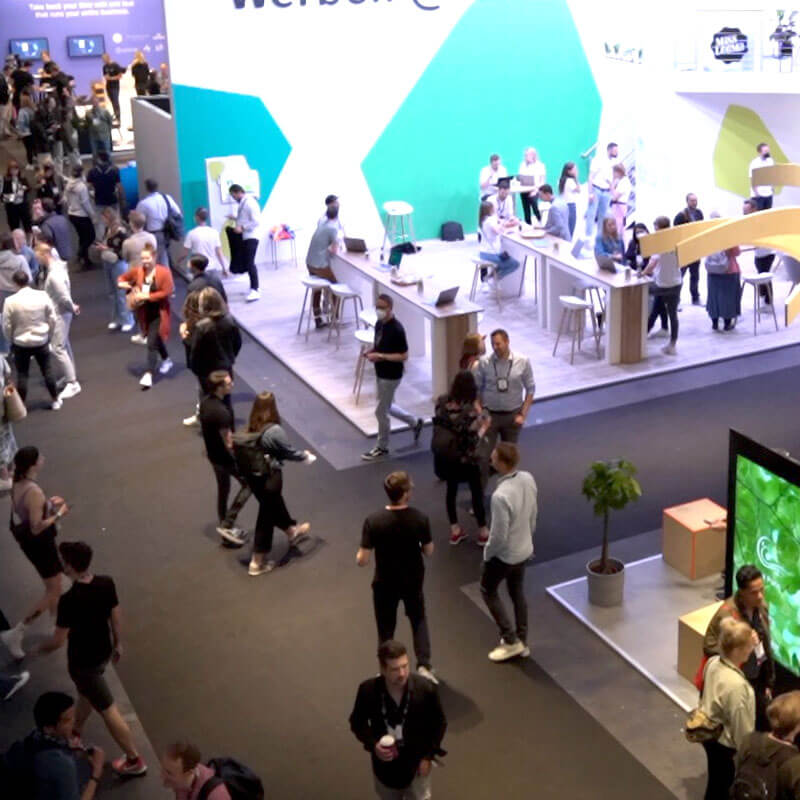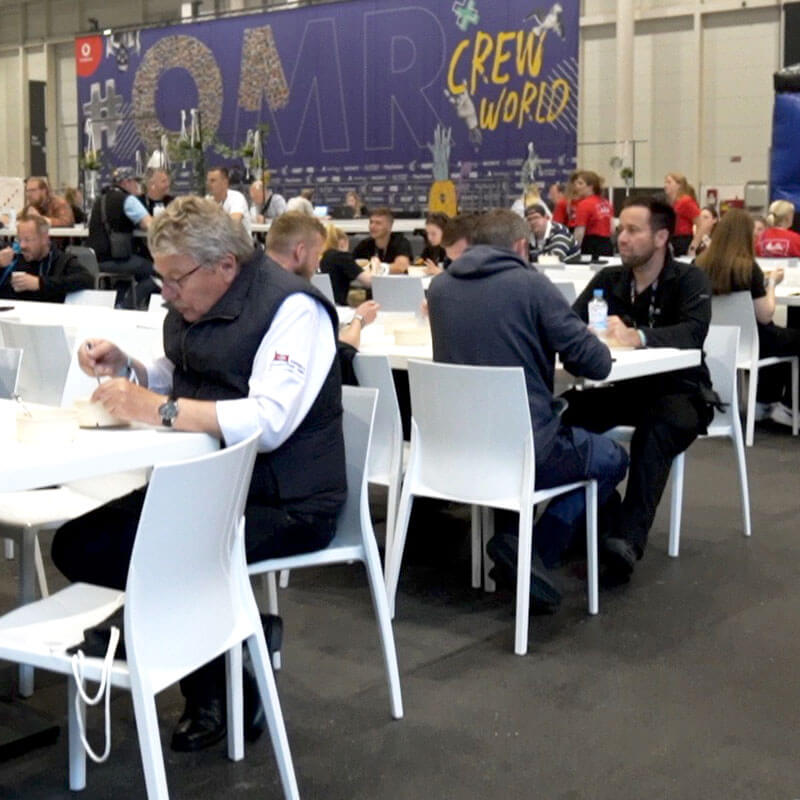Whether it’s an open-air festival, Christmas market, spring festival, or business event – since January 2023, the reusable offer obligation has also applied in the field of event catering. Many businesses fear additional effort by using reusables at events. However, more and more providers are taking care of implementing reusable systems, especially for events.
Save money, waste, and resources with reusable tableware at events
For safety reasons, reusable cups made of polypropylene (PP) have long been used at football games, music festivals, and many other events. The robust, shatterproof plastic cannot break like glass and injure people. Beyond the safety aspect, the use of reusable cups can also contribute to climate protection and resource conservation. The German Environmental Aid (DUH) calculated with its campaign “Reuse. Join in” that 1,000 PP reusable cups require only 1.4 kilowatt-hours of electricity for cleaning. In contrast, producing 1,000 single-use cups made of polyethylene (PET) requires 350 kilowatt-hours of electricity. Furthermore, the cups can be used for 3 to 4 years before they need to be replaced.
Due to the economic and ecological advantages, reusable systems are already used at many renowned major events. The German Protestant Kirchentag or the Munich Oktoberfest have been using sustainable reusable tableware for several years. More and more major events are joining, such as the Düsseldorf Rhine Fair and the Breminale. For additional environmental compatibility, more and more events are using reusable tableware made from renewable resources such as natural fibers and plant oils instead of petroleum-based plastics.
The investment in reusable tableware pays off in the long term due to its multiple usability. Additionally, the use of reusable tableware reduces waste. Particularly at festivals, trade fairs, or sporting events, a lot of waste is produced, often carelessly left on the grounds. By using reusable tableware and establishing a deposit system, procurement costs for disposable cups and packaging can also be saved. A major advantage is the multiple usability. Instead of having to dispose of large amounts of waste, reusable tableware is simply cleaned and reused. Although the introduction can initially involve additional costs and logistical challenges, the long-term benefits outweigh these. Thus, the decision for reusable tableware is not only economically sensible for organizers but also an important step towards a more sustainable event industry.



Catering and events: All in one wash
Event agencies have the option to rent a contingent of rental tableware when planning events. The tableware in circulation at the event can then be continuously cleaned and reused. Typically, reusable specialists offer the collection, washing, and drying of the tableware as part of a package. This includes a washing service and all logistics. For smaller events, washing units can be borrowed from municipalities or responsible organizers to ensure the hygienic cleaning of reusable containers throughout the event.
When choosing a reusable system for smaller events and large-scale events, the robustness of the material and its suitability for food are important. These should remain intact even after several wash cycles. Reusable bowls and containers that comply with the requirements of the applicable EU Regulation No. 10/2011 as food-safe can be recognized by the glass-fork symbol. It is usually found on the bottom or back.
Our reusable bowls were used in the catering of the Crew World at the OMR Festival in 2022. Since then, we have expanded our reusable offerings. The bowls, cups, and menu boxes are complemented by elegant tableware, burger boxes, and high-quality plates. All reusable packaging is dishwasher-safe, temperature-resistant and freezer-safe, as well as suitable for hot and cold dishes. Thanks to the so-called Bio-Compound, which is 98 percent made from renewable and biobased raw materials, they are also lighter and more shatterproof than porcelain.

Reusable: Hygiene regulations and deposits at events
The hygiene regulations associated with the reusable offer obligation for take-away also apply to events. Caterers, as food service establishments, are just as responsible for the safety of food and beverages as restaurants and canteens. Therefore, hygiene regulations must be followed. This includes separating areas for filling and returning containers as well as for serving. This ensures that no germs or other contaminants pollute the food during preparation and serving. The German Food Association provides specific information in its guide on hygiene when handling reusable tableware.
Reusable systems at events and gatherings
In general, reusable systems offer an inclusive deposit solution to prevent cups, bowls, and plates from being left behind and not returned. For reusable cups, the deposit is usually around 1 to 2 euros, and for larger meal containers and reusable bowls, a higher deposit of 5 to 6 euros is charged. If the deposit is too high, it can discourage visitors from using the reusable options. Therefore, deposit systems are increasingly being used that do not involve cash and deposits. This also makes processes more efficient and avoids high borrowing costs, which in turn impacts guest satisfaction. The company merways® offers an optimal solution with its free Mehrweg app. This app not only works without deposits and cash, but it is also independent of the containers used. Event organizers are not bound to a specific deposit system and can choose the containers that best fit their event. The app can be combined with any reusable container. This allows organizers to continue using their individually printed cups and bowls.
Creating sustainable memories
At some events, a certain loss of reusable tableware is anticipated. Especially event-specific reusable cups are popular souvenirs for which a small deposit is gladly paid. Think of the winter mulled wine cups at Christmas markets or the colorful festival cups. These cups are reused by visitors for several years. For the providers’ reusable pool, they are lost but do not create waste. Event organizers can use individually designed reusable packaging to plan sustainable keepsakes or even everyday use items.





